Managing BioWare’s Community
- Updated: 26th Nov, 2012
The BioWare community team were in London recently for a panel during the MCM Expo. I caught up with Jessica Merizen (Community and New Media Manager), Chris Priestly (BioWare Community Specialist) and Holly Conrad (Commander Shepard) to talk about managing a huge international community in the wake of one of the biggest controversies in video game storytelling.
Merizen and Priestly are the global community leads at BioWare, managing an international team of regional product managers and community managers in the UK, Poland, Australia and more.
Can you give any examples of what’s different, what’s more popular in say, Poland compared to the UK?
Chris Priestly: Europe as a whole compared to North America is much more story-based, as least from my experience. North America focuses a lot on the gameplay itself. This doesn’t exclude the fans in North America from disliking the story but they focus very heavily on how the game plays and how the combat works as well as the story, whereas people here in Europe I’ve noticed are more much more story first.
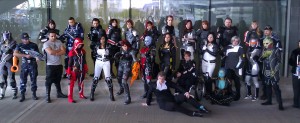 That the game shoots this way or the combat mechanic works this way – that can be accepted as long as the story supports what happens. It’s much more intrinsic to Europe than it is to America. It might just be my observation. [laughs] I’m sure right now someone in America is gonna hear this and write me a letter. “Dear Sir, I hate this. I’m tremendously into the story of your games.”
That the game shoots this way or the combat mechanic works this way – that can be accepted as long as the story supports what happens. It’s much more intrinsic to Europe than it is to America. It might just be my observation. [laughs] I’m sure right now someone in America is gonna hear this and write me a letter. “Dear Sir, I hate this. I’m tremendously into the story of your games.”
Jessica Merizen: I did a panel, a convention at GeekGirlCon a few months ago, dispelling the myth of the female perspective. I really don’t think there is one female perspective, one Swedish perspective. We’ve got a lot of different gamers – we keep in mind different gamer types.
Some people are very action-oriented, some people are more linear, they want to see how the story goes. And some other people are far more into customisation, strategy, so we try to keep that in mind but there are definitely some times where we can’t be everywhere. We can’t talk to everyone, especially where there’s language barriers, so that’s where our regions are incredibly important to us.
CP: BioWare is known for story-based games and whether it’s a fantasy game that works with magic and swords or whether it’s a science fiction game that works with light sabres and blasters, whatever it might be, the core story is the same for all regions. People who truly are fans of our games are the same but there’s always little interesting quirks in different areas.
We have a lot of fans that are fans of Tali and it doesn’t matter particularly where you are in the world, you’ll have a particular affection for that character and you’ll bond with other people who are also great fans of that character. It doesn’t matter what country you live in or whether you’re male or female or your sexual orientation – you just love that character. And that spans all of our games in all the different countries that we deal with.
I’ve heard some companies talk about using psychographics instead of demographics for development. Are you guys looking at that?
JM: I’m an anthropologist so, we’ve always approached community management differently here. To a lot of people, community is part of marketing, it’s part of PR. It is supporting the launch of the game. Our work doesn’t really begin until the game is out there and then we’re iterating on it.
We’re finding out what people like, what people didn’t like, gathering that feedback for future titles. We’re gathering feedback all the way throughout that cycle because we know that we’re not just hyping up the community and then once the game launches we move on to the next project. We’re there through the entirety of it and I think for me, I’ve always been much more qualitative. We do a lot of talking with the fans, we’ve done surveys in the past where we just find out what that feedback is so I don’t really have a cool buzzword to attach to what we do, just good old-fashioned fieldwork.
As community managers, what was it like for YOU guys when the whole ending controversy hit?
CP: Well, I think it was hard. Especially this being the end of a trilogy of games for fans that have been with us for 5 or 6 years that had a problem with the ending. It is hard to some extent because you want them to enjoy it. You want them to recognise the effort that the team put in. You want people that you like and work with to be happy.
We quickly realised though that it was sort of our oversight that how passionate our fans were and the reason that some were unhappy was because we did not do a good enough job in clarifying everything that goes on towards the end of the game. It’s a bit of a testament to the Mass Effect team how quickly they responded and they made the extended cut based on the feedback we had but we did also keep in mind though, it’s sort of human nature to complain more when you’re unhappy and to not communicate when you’re happy.
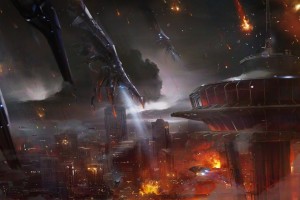 I use this metaphor that if you go out to a restaurant and you have a good meal, you don’t really tell people. If somebody asks you, did you go there and eat, “Oh yes, you should go there, it’s a good place.” But if you go and have a bad meal, you’ll tell people. You’ll say “Oh, I went there and it’s awful, don’t go.”
I use this metaphor that if you go out to a restaurant and you have a good meal, you don’t really tell people. If somebody asks you, did you go there and eat, “Oh yes, you should go there, it’s a good place.” But if you go and have a bad meal, you’ll tell people. You’ll say “Oh, I went there and it’s awful, don’t go.”
That was kind of the situation at the end of Mass Effect. We had a lot of fans that played Mass Effect and they did enjoy the endings, or they certainly walked away with “Good, I see how they ended that. I would have done it differently but I get what they did and why,” and they moved on. But there were a large community of very vocal people that didn’t enjoy the ending. And it wasn’t that there were so very many but they were so very vocal and to that extent, the team listened, they made the extended cut and I definitely think we’re in a better place now.
Holly Conrad: We were doing press for the Morgan Spurlock documentary and I was in the Middle East, in the middle of a film festival and some reporter comes up to me and says “Well, what do you think about the ending?” I’m like, “This is not the place for this right now. This is not even related to… I liked it, it was fun.” I feel like as – I mean I got to play the beta, I played through while the game was going on.
As a fan, as someone who’s seen the development, that I was involved with behind the scenes, it didn’t really… I got what they did. I wasn’t one of those people who was gonna out there and be like “Aaah, whatever.” It was like, “Okay, that’s the ending. I’m gonna go back to doing my day job” That’s how I felt about it.
I love the extended cut though. The extended cut was amazing because for me it was… obviously BioWare listened to the fans and it came out with an awesome extra piece. For me it was just an extra piece of dialogue. “Cool, I get hear more dialogue” ’cause I’m the kind of gamer that gets dialogue, reads all of it, listens to all of it and I love that war background. So for me it was just a bonus but I can see where people were coming from but at the same time it’s like… there’s other things to worry about.
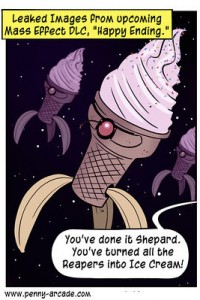 JM: That was one of our creative goals with the extended cut. We know that there were people who did like the original ending. There were people like the Penny Arcade guys, one of our first big public supporters saying “You know what, I liked it” in a time when some press people back-pedalled and played it down.
JM: That was one of our creative goals with the extended cut. We know that there were people who did like the original ending. There were people like the Penny Arcade guys, one of our first big public supporters saying “You know what, I liked it” in a time when some press people back-pedalled and played it down.
One of our big goals is, people who liked the original ending should still be able to play the extended cut and enjoy it. Maybe even enjoy it more, so all the work we did in the community team was in tandem with all the work that the developers were doing. A lot of people postponed their vacations just because this was an important thing for us to do for our fans. It was always decided that this was going to be at no additional cost to the consumer.
We were going to do this because we felt that it was important for the fans and to some extent, it is unprecedented. You have people who change something that they’ll charge for it or they will replace it and you’ve never seen the original but for us were like, “All right, well, this is all a big experiment.” We don’t always have all the answers and we’re working in partnership with our fans. We wouldn’t be here without the fans.
I liked the ending. The only problem I had was how the hell did they get on the ship?
JM: Yeah. We actually, we had a few big meetings, a lot of different people and different aspects of the company. Studio General Manager Aaryn Flynn started writing on a chalkboard.
There were different kinds of groups and we started listing out different kinds of players and what their things were and the two big groups that came out of that were people who were confused or wanted clarification on plot points, as well as people who wanted more closure with the characters that they loved. So those were the two groups that we decided to address with these.
HC: Or make everyone cry like babies at the endings.
JM: More opportunities to cry
HC: More opportunities to jerk the tears of the fans.
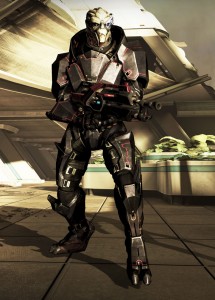 Saying goodbye to Garrus as well.
Saying goodbye to Garrus as well.
HC: I started sobbing. I couldn’t handle it.
CP: Holly loves Garrus.
HC: I do.
Everybody loves Garrus. Who doesn’t love Garrus?
HC: Jessica loves Miranda but, you know… [laughs]
JM: I do but I also love Garrus. I don’t even know if I’ve ever met anyone who’s like “I hate Garrus” If someone came up to me at a live event and was like “you know, that Garrus. I really hated him.” I’d probably run away. I’d be like “There’s something wrong with you” [Everybody bursts into fits of giggles]
HC: They can’t be a good person. I’d probably be like, “Stranger danger!”
CP: I don’t hate Garrus but I never use him.
JM: Well that’s fine.
CP: I don’t hate Garrus, I just never… he’s a sniper, I don’t need a sniper.
JM: If you hate Garrus, you’re probably Ted Bundy.
I never use Liara. I like to throw the Singularity. Get away, Liara. Do something else.
CP: That goes to the choice of the game. I think when we have people on the Internet who are like, I really hate that character. Really? You hate her that much? He/she is that bad?
JM: There are some characters that are very love/hate – like Jack is one of them, Miranda is another one – that are such strong personalities but then there are just ones like Tali or Garrus or Liara. They’re just good guys and it doesn’t matter if you’re romancing them or you’re just their friends or you’re playing a man or playing a woman, if you are a man or a woman. Somewhere in between, there’s a range of characters and choices and that’s the great thing about it.
I think something different about BioWare games is that we can sit around and have these conversations and that it’s not just something where it’s like, “Oh, did you do this or did you do that? What choice did you make?” It feels like a lot of these characters, a lot of these situations are just as tangible as us sitting around a coffee table. That’s what makes our community so amazing, is because we recognise that that is part of our player identity.
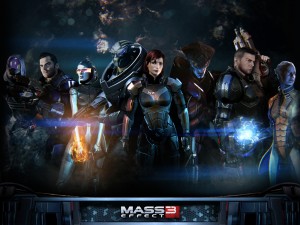 With some games, that link is not as strong. You can still talk about what Madden line-up you used but you’re not gonna be able to sit around the pub for three hours talking about the merits of different romances.
With some games, that link is not as strong. You can still talk about what Madden line-up you used but you’re not gonna be able to sit around the pub for three hours talking about the merits of different romances.
HC: It’s almost like you’ve met these characters in real life and you all know them. It’s almost like talking about a friend. “Oh, you know this person. Yeah, they’re awesome. Oh, I hate that person. They’re awful.” It’s like you all read the same book and you’re now having a reading circle about them.
You said that you take all the feedback and bring it back to the team and they can do what they want with it. I felt with Leviathan, the tone seemed different from previous storytelling. Has the storytelling process changed?
JM: I think that the amazing thing about DLC is that it allows the team to explore areas that they couldn’t have done in the main game. It also allows them to try their hand at something new.
One of the cool things about Leviathan – and different people felt different ways about it – is the investigation options. It felt a little sleuthy and that was definitely intentional for the team. They wanted it to kind of feel like a mystery that you were unravelling. That wasn’t a tone they had in the main game but because this was DLC and it was option, they were like, “Let’s try this different way of development.”
There’s a lot of testing that goes into DLCs that you wouldn’t normally be able to pull off with a whole main game because, what if sleuthing didn’t work and you just made a 120 hour game around that? But for DLC it’s a great place to experiment with new things and then the things that work they do take those into the next game or something in the future.
With Dragon Age and with Mass Effect; the DLC for Dragon Age 2, there are very tangible things you can see where you can tell that they were listening to feedback. So you’ll see the same thing with the Mass Effect series. They really are listening. They’re not always agreeing with the feedback but they are listening and really absorbing and taking it in.
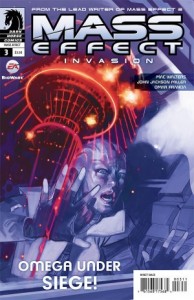 HC: I noticed with Lair of the Shadow Broker, that’s a really good example because they took a lot from that for Mass Effect 3. I noticed there was a big correlation from that to the game.
HC: I noticed with Lair of the Shadow Broker, that’s a really good example because they took a lot from that for Mass Effect 3. I noticed there was a big correlation from that to the game.
If Leviathan was investigation then what would you say is new for Omega?
JM: I can’t talk too much about Omega. We really don’t reveal too many details because we want to get people hyped up. We really want to be able to talk about it when you’re playing. But there are definitely things in Omega that… We are broadening our horizons. That’s as specific as I can get about it.
CP: I think that fans will will recognise that part of it will definitely be some conclusion. A lot of people knew the story of Aria and Omega what with having encountered it in Mass Effect 2 or having read Mac Walter’s Invasion comic from Dark Horse comics, and the story of how she loses it.
But when it wasn’t addressed in Mass Effect 3, that Aria was just sitting around in the citadel not doing anything, a lot of fans were like “No, that doesn’t make any sense.” So the team recognised there’s an option for closure here. So there’s definitely gonna be some story summation that probably won’t be exactly what the fans expect but we think they’re really gonna enjoy it.
Will there be more content for the ending again?
CP: Only in the smallest of ways. Like Leviathan there’s a small dialogue but really, the DLCs don’t affect the endings. The endings stand by themselves.
Thank you very much for the interview
What we do know about the Omega DLC is that you’ll be able to fight with Aria T’Loak as a member of your party. The new story teams you up with Aria and what looks like a female Turian in the battle to free Omega from Cerberus control. The DLC will also allow you to get the N7 Valkyrie Assault Rifle and the Chakram Launcher, which were previously only available as pre-order bonuses. See the launch trailer below.
Mass Effect 3 is out now for PC, Xbox 360 and PlayStation 3. The Special Effect Wii U edition will launch on Friday. The Omega DLC will be available tomorrow (27th November) for 360 and PS3.

Follow Us!